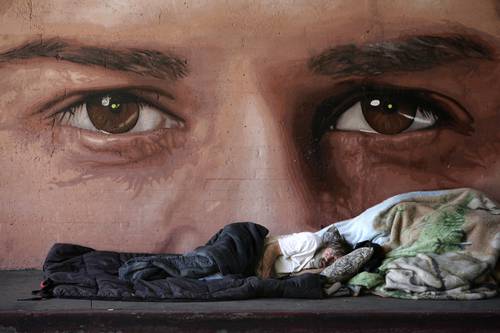
They see it, they say it — they do nothing
NEW YORK CITY — A young woman sits on a bench holding her baby. Nearby, a daughter, about 4 or 5 years old, wearing pigtails and a sad face, stares at the ground. The mother holds a piece of cardboard with the words “Please help.” Behind her, on a wall, there is a sign by the local police with the official antiterrorist slogan inaugurated after Sept. 11, which repeats everywhere: “If you see something, say something.”

That black-and-white drawing published by the New Yorker almost captures the moment.
It’s not that nobody sees them or nobody says anything, however. The point is just that they see it, they say it, but do nothing.
In fact, this Tuesday, the issue of economic inequality, the topic of the increasingly poorer and the increasingly richer will be key to President Barack Obama’s State of the Union speech. He has already said that inequality is “the defining challenge of our times” and it is expected that he will talk about broadening the “opportunity” for all who work hard so they can “share in the American dream,” or something like that.
But nobody expects him to propose an in-depth economic readjustment to generate jobs, eliminate the crushing debt (including the mortgage debts, which caused millions of people to lose their homes) or raise wages, which, for the great majority, have been stagnant for decades.
In other words, nothing that for now will alter the fact that this country records the worst level of economic inequality since the Great Depression. Some calculations suggest that only 400 families earn the same as 50 percent of the population with the lowest income. Between 80 and almost 90 percent of the wealth in the United States belongs to 20 percent of the population.
Apparently, that 20 percent — rather, the 1 percent that concentrates more than 35 percent of the nation’s wealth — is not pained by announcements like the one made by JPMorgan Chase last week, to the effect that it will almost double the salary of its CEO, Jamie Dimon, to a total of $20 million. This, shortly after the bank agreed to pay $13 billion to settle a lawsuit with the U.S. Department of Justice and admitted that it had deceived investors about investment packages backed by high-risk mortgages, some of the financial instruments that collapsed in 2006 and 2007, detonating the worst financial crisis since the Great Depression.
To some, all that was simply the greatest fraud in history, but no responsible financial executive has ended up in prison. In fact, almost all of them have been rewarded, while Wall Street and business earnings have set record indices and while millions have lost their jobs and more people are going hungry than ever before. In fact, almost all the benefits of the economic recovery since 2009 have been captured by the wealthiest 1 percent.
Meanwhile, in Davos, Switzerland, the world’s rich and powerful gathered for their annual summit to discuss one of the major topics: economic inequality. The responsible people were not sorry to express their “concern” and even lament the growing economic inequality in the world. (No doubt, they included some of the 85 multimillionaires who, according to an Oxfam report, concentrate a treasure equivalent to the wealth of half of mankind.)
In Miami, the sale of super-de-luxe Lamborghini cars (some costing $400,000) has set a record, and it turns out that the buyers are not just Americans but in recent times have included super-rich immigrants from Mexico, Venezuela, Brazil, Russia and China.
In New York City, luxury hotels offer suites for $15,000 per night. Rich people buy apartments for $90 million.
And the figures of misery — hunger, joblessness, homelessness, canceled dreams — continue to be reported. Well, almost always, the rise or decline of stock market figures is more newsworthy than how many poor families slept on the street amid a ferocious winter.
The whole world sees this. A recent survey by the Pew Research Center and USAToday showed that 65 percent of the respondents believe that the gap between the rich and all the others has grown in the past decade. Most respondents, 54 percent, are in favor of raising taxes to the rich to help the poor.
It is not surprising that citizens have little confidence in their government. According to a Gallup poll, 65 percent (two thirds) of Americans say they are “unhappy” with the “system of governance” (how the government works) in the United States — a record level. In another Gallup poll, only 17 percent believe that most legislators now in Congress deserve to be reelected, the lowest level ever recorded. Only 46 percent believe that their legislative representative deserves to be reelected, the lowest level since 1992.
Nobel Prize-winning economist Paul Krugman argues that economic inequality helped generate the conditions for the past crisis and that, moreover, that inequality is worsening due to the high rate of unemployment and the stagnant wage levels. Another Nobel Prize-winning economist, Joseph Stiglitz, the renowned analyst and former U.S. Secretary of Labor Robert Reich, and others sound that alarm that all this needs urgent action, that democracy itself is at risk because of inequality.
Everyone sees, everyone says. Everyone knows.
It’s not all that complicated. “Do not waste your time on social questions. The problem with the poor is poverty; the problem with the rich is uselessness,” said George Bernard Shaw.
(From the Mexican newspaper La Jornada.)

